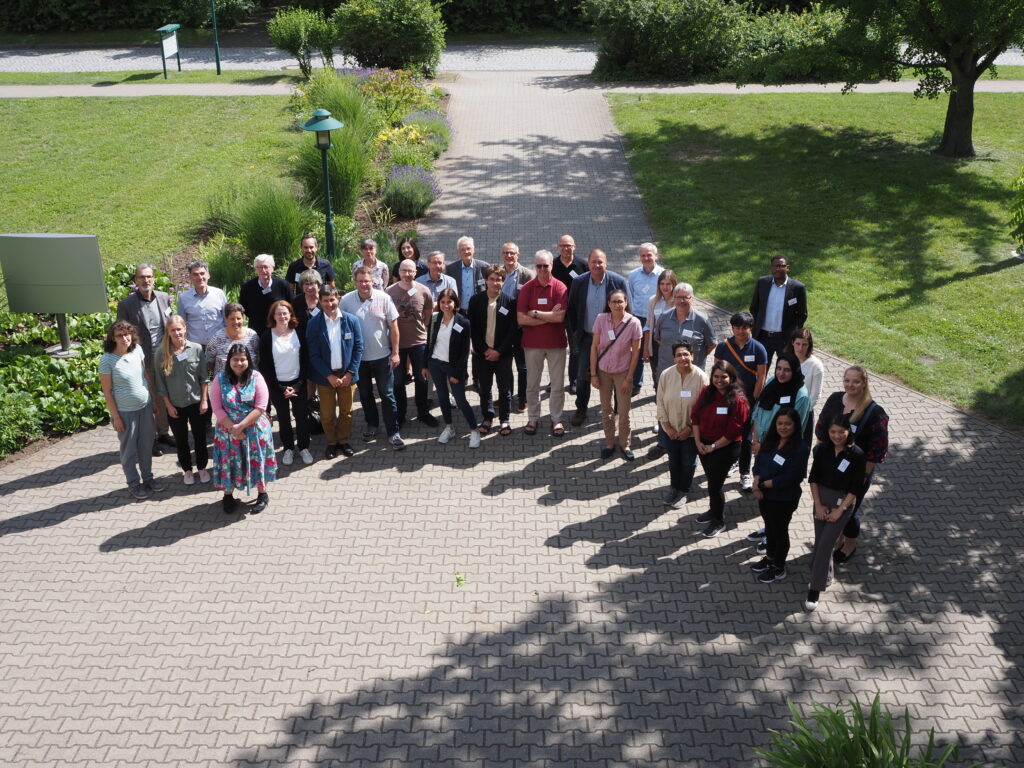AG Leiter:
Prof. Dr. Karl Schmid, Hohenheim
Den Termin des nächsten AG-Treffens finden Sie im GPZ-Terminkalender!
Dort finden Sie auch die aktuellen Programme der Veranstaltungen sowie Informationen zur Anreise, etc.
Kommende Veranstaltungen der AG

Ziel der Arbeitsgruppe
Im Mittelpunkt der Aktivitäten der AG Genetische Ressourcen stehen Fragen der Erhaltung und Nutzbarmachung pflanzengenetischer Ressourcen. Die Themengebiete erstrecken sich von Fragestellungen zur Evolution und Domestikation, den Auf- und Ausbau von Sammlungen sowie aktuelle Entwicklungen im Bereich des Erhaltungsmanagements (On-farm, Ex-situ, In-situ). Weitere Themenschwerpunkte beinhalten die Optimierung der Bedingungen zur Langzeitlagerung von Saatgut, neue Entwicklungen auf den Gebieten der In-vitro Erhaltung und Cryo-Lagerung sowie der taxonomischen, phänotypischen und molekularen Charakterisierung von Sammlungsmaterial. Ergänzend zu Forschungsfragen werden aktuelle Fragestellungen der gesetzlichen Regelungen für den Zugang und der Vorteilsausgleich zur PGR sowie im Umgang mit digitaler Sequenzinformation (DSI) behandelt.
The Genetic Resources Working Group activities focus on questions of conservation and utilisation of plant genetic resources. The topics range from questions on evolution and domestication, the establishment and advancement of collections, and current developments in the field of conservation management (on-farm, ex-situ, in-situ). Further topics include the optimisation of conditions for long-term seed storage, new developments in the areas of in-vitro conservation and cryo-storage, and the taxonomic, phenotypic, and molecular characterisation of collection material. Complementary to research questions, current issues of legal regulations for access and benefit-sharing to PGR as well as in the handling of digital sequence information (DSI) are addressed.
Neuigkeiten aus der AG
- Führungswechsel bei der AG 5
Die Arbeitsgemeinschaft 5 (AG 5) der Gesellschaft für Pflanzenzüchtung (GPZ) setzt sich mit der Nutzung genetischer Ressourcen in der Pflanzenzüchtung auseinander. Bei der jüngsten Tagung der AG im Juli 2023 am Leibniz-Institut für Pflanzengenetik und Kulturpflanzenforschung (IPK) in Gatersleben fand ein Führungswechsel statt. Prof. Dr. Andreas Graner, der bis dahin die Arbeitsgemeinschaft leitete, übergab sein Amt zum 01.08.2023 an Prof. Dr. Karl Schmid.

Prof. Dr. Karl Schmid Leider hatten die Auswirkungen der Pandemie die regelmäßigen Treffen der AG 5 unterbrochen, was die Kommunikation und den Austausch unter den Mitgliedern erschwerte. Mit neuem Elan soll diese wichtige Tradition nun wieder aufgenommen werden. Geplant ist, im zweijährigen Rhythmus ein Treffen zu organisieren. Das zukünftige Programm der Tagungen wird besonders darauf abzielen, jungen Wissenschaftlern eine Plattform zur Präsentation ihrer Forschungsergebnisse zu bieten. Neben grundlagenorienterten Forschungsarbeiten sollen dabei die Relevanz der genetischen Ressourcen für die praktische Pflanzenzüchtung und Züchtungsunternehmen sowie die Schnittstellen zur politischen und rechtlichen Nutzung von pflanzengenetischen Ressourcen im Fokus stehen. Das nächste Treffen der Arbeitsgemeinschaft ist für das Jahr 2025 angesetzt.
Viele Grüsse,
Karl Schmid
- Meeting Report AG 5, 5th and 6th July 2023, IPK Gatersleben
On 5th and 6th July 2023, the working group convened a workshop themed “Activating Plant Genetics Resources in the Crosshairs of Plant Breeding” at IPK Gatersleben. Forty colleagues attended to present their results and to discuss the most recent developments in their research fields.
Agricultural production faces a transformation which is required to address manifold challenges including the increasing demand for food and feed, the quest for renewable resources, and the loss of biodiversity. At the same time agriculture needs to cope with the vagaries of climate change. The goals set out by the EU commission in the green deal and the farm to fork strategy represent guardrails for the transition towards sustainable production systems. However, transformation of agricultural production systems is contingent on innovations in the field of agroecology, which describes a dynamic, transdisciplinary concept including multiple stakeholders and has gained ground and has been promoted by FAO over the past decade. Plant genetic resources (PGR) will be indispensable to spark innovations to increase agrobiodiversity, enhance the sustainability of production systems, strengthen the resilience of crops and warrant sufficient yields to ensure food security. To reach these goals informed access to collections needs to be facilitated by collating together information at the genetic, biochemical and phenotypic levels in a systematic fashion and by combining both established and innovative approaches. The focus of Ex-situ collections needs to be extended from the acquisition and conservation of biological material to becoming information hubs that collect and provide digital information to help predict phenotypic performance.
The workshop featured 11 invited talks and nine short presentations. The programme can be downloaded at https://meetings.ipk-gatersleben.de/gpz-workshop/program-2/.
In the session Access and Benefit Sharing, the challenges were highlighted that are required to implement and comply with legal regulations. The multilateral system developed by the FAO and which became effective through the International Treaty on Plant Genetic Resources for Food and Agriculture (ITPGRFA) represents a manageable framework for access and benefit sharing. However, the ITPGRFA is only applicable to 30 crops. All remaining plant species fall under the regulation of the Nagoya Protocol (NP), which is far more complex. The incommensurate administrative burdens imposed by the NP are about to smother the collection and exchange of, as well as research on and with PGR.
In a similar manner the use of DNA sequence information on genetic resources might be curbed, if attempts to its regulation and restrict its use will be endorsed by the Conference of the Parties (COP). The scientific community needs to raise its voice to avert these attempts.
The session on Conservation Management addressed the manifold challenges, opportunities and limitations that come with Ex-situ, On-farm and In-situ conservation. Each conservation strategy has its specific scope and scale. It became clear that the on-farm cultivation of field crops, such as lentils, is restricted to few cultivars only and cannot replace Ex-situ conservation at large scale.
In the session Taxonomy and Characterization the benefit of sequencing the oat genome was highlighted to study the evolutionary history of this species.
The need for the phenotypic characterization of PGR was illustrated by screening Pisum sativum germplasm for virus resistance.
The Activation of PGR for Breeding and Utilization represents the ultimate goal of any conservation effort. Molecular genetics has contributed to the development of introgression-libraries of wild germplasm into elite background. These allow for the transfer of useful traits as was demonstrated for barley.
Regarding the use of PGR for pre-breeding in wheat, the systematic sequence analysis of the entire IPK winter wheat collection and the phenotypic analysis of a training set allowed for the prediction of the parental breeding values for the entire wheat collection.
Presently, evolutionary plant breeding is being promoted as an innovative approach to breed for locally adapted germplasm. The results of a multi-year and multi-location case study in barley hint at the limitation of this approach, since no yield improvements could be observed.
The workshop was concluded by a session on Digitalization and Information Management. Here, the advancement the databases such as GBIS and EURISO reported. The WebPortal “Divbrowse” was introduced to provide a low-threshold entry point for the exploration of genomic information of wheat to help select accessions from the ex-situ collection.
The workshop was concluded with the election of Karl Schmid (University of Hohenheim) to succeed Andreas Graner as the chair of the working group.

Andreas Graner, IPK Gatersleben

